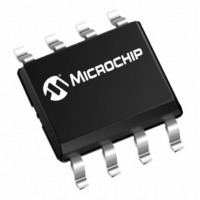24LC16B-I/MS Microchip Technology, 24LC16B-I/MS Datasheet - Page 11

24LC16B-I/MS
Manufacturer Part Number
24LC16B-I/MS
Description
IC EEPROM 16KBIT 400KHZ 8MSOP
Manufacturer
Microchip Technology
Specifications of 24LC16B-I/MS
Memory Size
16K (2K x 8)
Package / Case
8-MSOP, Micro8™, 8-uMAX, 8-uSOP,
Operating Temperature
-40°C ~ 85°C
Format - Memory
EEPROMs - Serial
Memory Type
EEPROM
Speed
400kHz
Interface
I²C, 2-Wire Serial
Voltage - Supply
2.5 V ~ 5.5 V
Organization
8 Block x 256 x 8
Interface Type
I2C
Maximum Clock Frequency
0.4 MHz
Access Time
900 ns
Supply Voltage (max)
5.5 V
Supply Voltage (min)
2.5 V
Maximum Operating Current
5 mA
Maximum Operating Temperature
+ 85 C
Mounting Style
SMD/SMT
Minimum Operating Temperature
- 40 C
Operating Supply Voltage
2.5 V, 5.5 V
Lead Free Status / RoHS Status
Lead free / RoHS Compliant
Lead Free Status / RoHS Status
Lead free / RoHS Compliant, Lead free / RoHS Compliant
Other names
24LC16BI/MS
Available stocks
Company
Part Number
Manufacturer
Quantity
Price
Company:
Part Number:
24LC16B-I/MS
Manufacturer:
MICROCHIP
Quantity:
12 000
8.0
Read operations are initiated in the same way as write
operations, with the exception that the R/W bit of the
slave address is set to ‘
of read operations: current address read, random read
and sequential read.
8.1
The 24LC16B contains an address counter that main-
tains the address of the last word accessed, internally
incremented by ‘
(either a read or write operation) was to address
next current address read operation would access data
from address
with R/W bit set to ‘
edge and transmits the 8-bit data word. The master will
not acknowledge the transfer, but does generate a Stop
condition and the 24LC16B discontinues transmission
(Figure 8-1).
8.2
Random read operations allow the master to access
any memory location in a random manner. To perform
this type of read operation, the word address must first
be set. This is accomplished by sending the word
address to the 24LC16B as part of a write operation.
Once the word address is sent, the master generates a
Start condition following the acknowledge. This
terminates the write operation, but not before the inter-
nal Address Pointer is set. The master then issues the
control byte again, but with the R/W bit set to a ‘
24LC16B will then issue an acknowledge and transmit
the 8-bit data word. The master will not acknowledge
the transfer, but does generate a Stop condition and the
24LC16B will discontinue transmission (Figure 8-2).
8.3
Sequential reads are initiated in the same way as a
random read, except that once the 24LC16B transmits
the first data byte, the master issues an acknowledge
as opposed to a Stop condition in a random read. This
directs the 24LC16B to transmit the next sequentially-
addressed 8-bit word (Figure 8-3).
To provide sequential reads, the 24LC16B contains an
internal Address Pointer that is incremented by one
upon completion of each operation. This Address
Pointer allows the entire memory contents to be serially
read during one operation.
© 2009 Microchip Technology Inc.
READ OPERATION
Current Address Read
Random Read
Sequential Read
n + 1
1
’. Therefore, if the previous access
1
. Upon receipt of the slave address
’, the 24LC16B issues an acknowl-
1
’. There are three basic types
1
n
’. The
, the
8.4
The 24LC16B employs a V
which disables the internal erase/write logic if the V
is below 1.5V at nominal conditions.
The SCL and SDA inputs have Schmitt Trigger and
filter circuits which suppress noise spikes to assure
proper device operation, even on a noisy bus.
Noise Protection
CC
threshold detector circuit
24LC16B
DS22213A-page 11
CC















